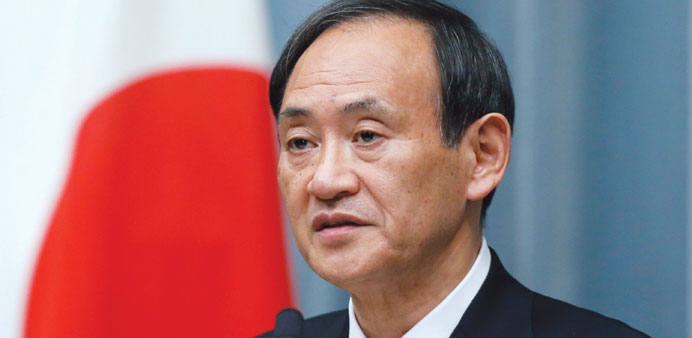Bloomberg
Tokyo
The Bank of Japan (BoJ) still has policy options to continue its unprecedented monetary easing, Chief Cabinet Secretary Yoshihide Suga said in an interview days after the central bank announced it wouldn’t expand its main stimulus target.
“I think they still have policies they can pursue,” Suga said at his offices in Tokyo when asked about concerns the programme could be reaching its limits. “I am not at all pessimistic about this.”
Suga, Prime Minister Shinzo Abe’s top aide, said the central bank should continue efforts to achieve its 2% inflation target, and that there is no need to change the law to increase political control over the BoJ, as has been suggested by some lawmakers.
Nearly three years into a record easing programme aimed at shaking off the deflation that has dogged the Japanese economy for years, the BoJ now holds more of the country’s sovereign debt than any other class of investor, and shrinking trading activity of Japanese government bonds has cast doubt on central bank Governor Haruhiko Kuroda’s contention that bond-buying stimulus has no limits.
“It’s still technically possible for the BoJ to accelerate its purchase of Japanese government bonds from the market,” said Junko Nishioka, chief economist for Japan at Sumitomo Mitsui Banking Corp in Tokyo. Whether Abe wants the central bank to ease further depends on the direction of the yen - if the yen weakens further the government will face criticism over higher prices in the run up to an upper house election next summer, she said.
The Japanese currency fell 0.3% to 120.58 against the dollar in Tokyo on Thursday. The yen has weakened about 30% since Abe came to power in December 2012 with a promise of “bold” monetary easing. The BoJ announced it would lengthen the average maturities of Japanese government bonds it buys to seven to 12 years from the current seven to 10 years.
It also established an additional program to buy ¥300bn ($2.5bn) in exchange-traded funds, targeting companies that invest “proactively in physical and human capital,” starting in April 2016. The effort to prod corporate Japan signals the central bank backs the government’s priorities, Suga said.
The latter move “shows that the BoJ sees the government’s policies as appropriate,” Suga said. “The government has been pursuing corporate tax reforms, investment reforms and raising the minimum wage. The BoJ is supporting us,” Suga said.
While Abe has repeatedly urged companies to invest more, there has been little sign of them tapping their cash hoards, which reached another record last quarter.
“Corporate executives have still not thrown off the deflationary mindset,” Suga said, adding that a stable administration was an important factor to convince them to start spending. “Many people wondered if policies might change. When people start to believe that the same administration will continue with the same policies for three or four years, they start to think about capital investment.”
Nishioka said Japan’s corporate mindset has yet to fully recover from deflation. “Sustained inflation expectations need to rise to around 2% for the corporate sector to change its minds about spending their money,” she said.
Abe completes three years in power this week, leaving him on course to become the longest serving prime minister since at least the 1970s. His coalition enjoys solid majorities in both houses of parliament, and has benefited from an opposition that remains in disarray. Suga has been a key architect of Abe’s longevity by maintaining discipline within the Abe Cabinet.
Abe’s economic mix of fiscal stimulus and monetary easing known as Abenomics spurred corporate profits and fuelled a more than 90% gain in the benchmark Topix stock index since his election.

Suga: Optimistic about growth.
